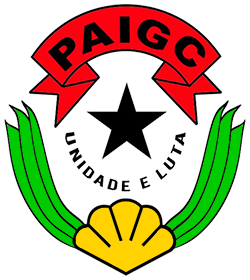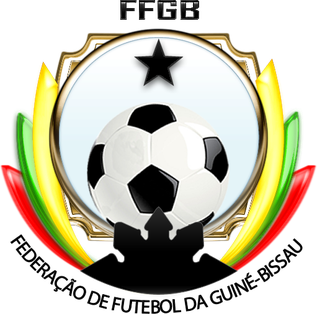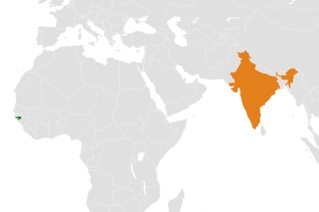This article needs additional citations for verification .(February 2024) |
| |||||
| Decades: | |||||
|---|---|---|---|---|---|
| See also: | |||||
The following lists events that happened during 2010 in the Republic of Guinea-Bissau .
This article needs additional citations for verification .(February 2024) |
| |||||
| Decades: | |||||
|---|---|---|---|---|---|
| See also: | |||||
The following lists events that happened during 2010 in the Republic of Guinea-Bissau .

Guinea-Bissau, officially the Republic of Guinea-Bissau, is a country in West Africa that covers 36,125 square kilometres (13,948 sq mi) with an estimated population of 2,026,778. It borders Senegal to its north and Guinea to its southeast.

The geography of Guinea-Bissau is that of low coastal plains bordering the Atlantic Ocean. The country borders Senegal in the north and Guinea in the southeast.

The politics of Guinea-Bissau take place in a framework of a semi-presidential representative democratic republic, with a multi-party system, wherein the President is head of state and the Prime Minister is head of government. Executive power is exercised by the government. Legislative power is vested in both the government and the National People's Assembly.
Telecommunications in Guinea-Bissau include radio, television, fixed and mobile telephones, and the Internet.

The Revolutionary Armed Forces of the People is the national military of Guinea-Bissau. It consists of an army, a navy, an air force, and paramilitary forces. The World Bank estimated that there were around 4,000 personnel in the armed forces. The estimated military expenditure are $23.3 million, and military spending as a percentage of GDP is 1.7%.

Bissau is the capital and largest city of Guinea-Bissau. As of 2015, it had a population of 492,004. Bissau is located on the Geba River estuary, off the Atlantic Ocean, and is Guinea-Bissau's largest city, major port, its administrative and military center.

The African Party for the Independence of Guinea and Cape Verde is a political party in Guinea-Bissau. Originally formed to peacefully campaign for independence from Portugal, the party turned to armed conflict in the 1960s and was one of the belligerents in the Guinea-Bissau War of Independence. Towards the end of the war, the party established a socialist one-party state, which remained intact until multi-party democracy was introduced in the early 1990s. Although the party won the first multi-party elections in 1994, it was removed from power in the 1999–2000 elections. However, it returned to office after winning parliamentary elections in 2004 and presidential elections in 2005, since which it has remained the largest party in the National People's Assembly.

João Bernardo "Nino" Vieira was a Bissau-Guinean politician who served as President of Guinea-Bissau from 1980 to 1999, except for a three-day period in May 1984, and from 2005 until his assassination in 2009.

The Guinea-Bissau national football team represents Guinea-Bissau in men's international association football and it is controlled by the Football Federation of Guinea-Bissau, The team has never qualified for the FIFA World Cups but qualified for the Africa Cup of Nations four times, making their debut in 2017. The team is a member of both FIFA and Confederation of African Football (CAF).
Military unrest occurred in Guinea-Bissau on 1 April 2010. Prime Minister Carlos Gomes Junior was placed under house arrest by soldiers, who also detained Army Chief of Staff Zamora Induta. Supporters of Gomes and his party, PAIGC, reacted to the move of the military by demonstrating in the capital, Bissau; Antonio Indjai, the Deputy Chief of Staff, then warned that he would have Gomes killed if the protests continued.

United Nations Security Council Resolution 1949, adopted unanimously on 23 November 2010, after recalling previous resolutions on the situation in Guinea-Bissau, particularly Resolution 1876 (2009), the Council extended the mandate of the United Nations Integrated Peacebuilding Office in Guinea-Bissau (UNIOGBIS) for a further period of one year until 31 December 2011.

People's Republic of China – Guinea-Bissau relations refers to the current and historical relationship between the People's Republic of China (PRC) and Guinea-Bissau. Relations were established in March 1974, several months before Guinea-Bissau's September 1974 independence. From 1990 to 1998, Guinea-Bissau maintained diplomatic relations with the Republic of China (Taiwan) rather than with the People's Republic. Relations were reestablished in 1998 and maintained since.
The WHO's estimate of life expectancy for a female child born in Guinea-Bissau in 2008 was 49 years, and 47 years for a boy. in 2016 life expectancy had improved to 58 for men and 61 for women.

On 12 April 2012, a coup d'état in Guinea-Bissau was staged by elements of the armed forces about two weeks before the second round of a presidential election between Carlos Gomes Júnior and Kumba Ialá. The coup started in the evening with military personnel and equipment making its way onto the streets, followed by the state-owned media being taken off-air.

The Guinea-Bissau women's national football team represents Guinea-Bissau in international women's football. It is governed by the Football Federation of Guinea-Bissau. It has played in two FIFA-recognised matches, both in 2006 against Guinea. The country also has a national under-17 side which participated in the 2012 Confederation of African Football qualifiers for the FIFA U-17 Women's World Cup. Football is the most popular women's sport in the country. A women's football programme was established in 2004, followed by the creation of a women's national league.
José Luís Mendes Lopes, known as Zezinho, is a Bissau-Guinean professional footballer who plays as a midfielder for Cypriot club Omonia Aradippou and the Guinea-Bissau national team.

Guinea-Bissau–India relations refers to the international relations that exist between Guinea-Bissau and India. The embassy of India in Dakar, Senegal is concurrently accredited to Guinea-Bissau. India opened an Honorary Consulate in Bissau on 28 May 2010. Guinea-Bissau has no diplomatic mission in India.
Bissau is a city in Guinea-Bissau, a country in West Africa, formerly part of the kingdom of Kaabu and part of the Mali Empire.
The COVID-19 pandemic in Guinea-Bissau is part of the worldwide pandemic of coronavirus disease 2019 caused by severe acute respiratory syndrome coronavirus 2. The virus was confirmed to have reached Guinea-Bissau in March 2020.

Bissau-Guinean nationality law is regulated by the Constitution of Guinea-Bissau, as amended; the Bissau-Guinean Nationality Regulation, and its revisions; and various international agreements to which the country is a signatory. These laws determine who is, or is eligible to be, a national of Guinea-Bissau. The legal means to acquire nationality, formal legal membership in a nation, differ from the domestic relationship of rights and obligations between a national and the nation, known as citizenship. Nationality describes the relationship of an individual to the state under international law, whereas citizenship is the domestic relationship of an individual within the nation. Bissau-Guinean nationality is typically obtained under the principle of jus soli, i.e. by birth in Guinea-Bissau, or jus sanguinis, i.e. by birth in Guinea-Bissau or abroad to parents with Bissau-Guinean nationality. It can be granted to persons with an affiliation to the country, or to a permanent resident who has lived in the country for a given period of time through naturalization.